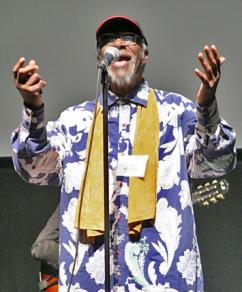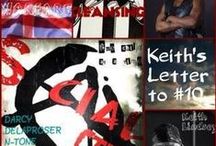looks at how musicians are venting their outrage at a fresh injustice.

Lester Chambers at the microphone (Doc Searls)
DINALYNN ANDREWS Potter--the bigoted woman who decked 73-year-old soul singer Lester Chambers at a California music festival the night of the George Zimmerman verdict--likely didn't have an "agenda" when she rushed the stage. She had no way of predicting that Chambers would dedicate a song to Trayvon Martin during his performance hours after the jury announced its not-guilty verdict.
Her actions, however, show that there are a great many white people out there clutching firmly to what W.E.B. Du Bois called their "psychological wage"--their perceived reward for their skin color. Whether "pre-meditated" or not, such actions are always deliberate and intimidating--and it would be a mistake to not view it as a very real consequence of the same racist system that let Zimmerman off the hook.
Perhaps it goes without saying that this intimidation hasn't worked. The marches, demonstrations, vigils and speakouts since Zimmerman was acquitted have been too numerous to list, in every city in the U.S., and even reaching internationally.
Chambers, for his part, will likely mention Trayvon again, given that he has a history of speaking out. The story of the assault on him has gained wide coverage, thanks partially to the work of his son Dylan, and because the outrage around the Zimmerman verdict is so palpable. What's more, there are plenty of other musicians who have followed Chambers' lead in one way or another.
At a concert with the E Street Band in Limerick, Ireland on Tuesday, July 16, Bruce Springsteen dedicated "American Skin (41 Shots)" to Trayvon Martin. According to Star-Ledger writer Stan Goldstein, a fan had been holding a sign requesting the song. "Where's that sign?" Springsteen asked. After it had been passed up, he grabbed it and said, "I want to send this one out as a letter back home. For justice for Trayvon Martin."
"American Skin" was originally written after the New York Police Department shot and killed Guinean immigrant Amadou Diallo in the doorway to his apartment building in 1999. In response to the song, the Patrolmen's Benevolent Association called for a boycott of Springsteen's shows. "American Skin" was also dedicated to Trayvon during last year's Wrecking Ball tour.
The Roots' Questlove wrote a column for New York magazine that at first comes off in Questo's quirky, self-deprecating idiom, but ends up devastating:
I don't know how to not internalize the overall message this whole Trayvon case has taught me:Reading this piece, one is struck by how much it has in common with Frantz Fanon's essay "The Fact of Blackness" from his Black Skin, White Masks--in substance, if not tone: a reminder of the internalization of racial oppression, "that crushing objecthood" that at one time or another is bound to affect even the well-off among the oppressed, the standards that leave one "straddling between Nothingness and Infinity."
You ain't shit.
That's the lesson I took from this case.
You ain't shit.
Young Jeezy's contribution is poignant. Some might also call it "surprising," but that really says more about the way we're taught to think about those tragically labeled "crack rappers," which is to say "not as complex human beings." Jeezy has always been one of those artists who does what he does, and he's spoken out on Trayvon previously. The song is cynical, hard and rather impossible to disagree with: "It's a Cold World."
"I am in no way shape, form, or fashion trying to capitalize off of the latest series of events," wrote Jeezy in a statement. "These are my true feelings and my form of expression about it." It's available for listen at his SoundCloud page.
And then, of course, there have been the Tweets and Facebook posts. Juelz Santana, Wu Tang Clan's Raekwon, Wale, Twista, Big Boi, Rihanna, John Legend, even Miley Cyrus and Mandy Moore denounced the verdict online.
- - - - - - - - - - - - - - - -
IT'S WORTH taking a step back here and reminding ourselves: All the songs, dedications and Tweets in the world won't put Zimmerman back in front of a jury and prosecutor, let alone assure that they do their job this time around. At the same time, we can't shrug these words off, as so many cynics seem to do when they claim that it's all just a bunch of celebs jumping in front of the spotlight.
Art is bound to reflect the anxieties and tensions of the time in which it's made--otherwise, it wouldn't be interesting, would it? Sometimes that tension is a rather shallow one, easy to tap into and a cinch to commodify. Other times, it's a lot messier. And that's when things get interesting. Though it's not the role of artists to present us with "alternatives," tensions that run this deep can sometimes put these same artists in a position to reshape the way that people think.
Enter Stevie Wonder. The soul and R&B legend knows a thing or two about boycotts. He refused to play in apartheid South Africa. Last year, he was convinced to cancel his appearance at the Friends of the Israeli Defense Forces gala. And during a concert in Quebec a few days after Zimmerman's acquittal, he announced that he would not be playing in Florida for the foreseeable future:
I decided today that until the Stand Your Ground law is abolished in Florida, I will never perform there again. As a matter of fact, wherever I find that law exists, I will not perform in that state or in that part of the world...You can't just talk about it, you gotta be about it.There had been rumblings of a boycott of Florida almost as soon as the verdict came down; Stevie's announcement has put the strategy on a higher platform. Though early reports of the spread of the boycott appear to be an exaggeration, it's still a worthwhile consideration. Any state that allows these kinds of things to happen deserves this silence, buttressed by the cacophony of our protest and outrage. If our side feels the consequences, then so should theirs.
http://socialistworker.org/2013/07/24/musicians-stand-for-trayvon

No comments:
Post a Comment